Plot
Alem is a refugee from Ethiopia. His parents are both Eritrean and Ethiopian. Alem then escapes to England from a violent civil war in Badme, which at the time of the novel (2000/1999) was disputed to be either in Ethiopia or in Eritrea. In 1991, 14-year-old Alem and his father are in the capital of Eritrea, his mother's home country. When Alem is ten years old, he and his family move to Harar in Ethiopia, his father's country. In Ethiopia, his father gets a better job within the postal service, but Alem's mother loses her job because the Ethiopian workers say they are "at war with Eritrea, so they will not work with someone from Eritrea". Alem's father is then told by his co-workers that he must leave his wife because she is Eritrean and therefore "the enemy". The mother was held at point blank before pushed on the bus.
One night the police break into Alem's home and force the family, along with other mixed families, onto buses going back to Eritrea. After returning to Eritrea the family begins to experience the same discrimination, and Alem is attacked and beaten at school. The father was held at point blank before pushed on the bus.
Alem's father takes him to London, England, under the pretext of a holiday to celebrate his fourteenth birthday. They stay in a hotel near Heathrow, in Datchet, and his father takes Alem sightseeing in London. They finish the day with an Amharic goodnight. Then, Alem wakes up and looks over to the empty bed beside him and thinks he is at breakfast, but he finds that he has left him alone with a letter. The letter says that he and Alem's mother will continue to fight for peace with the organisation EAST and that they hope one day Alem can rejoin them. Mr. Hardwick allows Alem to stay for a few days and on the final day he brings in the Refugee Council, who send Alem to a children's home. His time at the home is violent and disturbing as a rude boy Sweeny decides to beat him up and he tries to run away but ends up back at the home. He is then moved to London and placed in a foster family (the Fitzgerald's). Mr. and Mrs. Fitzgerald are a professional foster family. Ruth, their teenage daughter, seems unhappy with Alem. Alem returns from his first day at school, where he has made two friends, Robert and Buck, to discover a letter from his father indicating his mother has gone missing.
Alem receives a letter from the Home Office rejecting his application for asylum. An appeal date is set for 7 January 2000, where Alem meets Nicholas, his barrister, and charms the judge by wishing everyone a happy Christmas. At the appeal a hearing date is set for 16 February. Soon after Christmas, Alem receives another letter from his father explaining that his mother has been killed and that his father will try to get Alem back. Ruth, the foster family's daughter, provides solace for Alem.
His father soon turns up at his house and they go for dinner (spaghetti). The following Monday, Alem comes home to find that his father had gone to the Home Office to submit his asylum application, but was arrested and taken to Campsfield House immigration detention centre. Nicholas will also represent Alem's father and apply for their dank bail. Bail is awarded, and Alem's father is put into a grimy hostel in Forest Gate, and it is revealed that both Alem's and his father's application for asylum will be heard together.
On 15 February Alem, his father, Nicholas and Mrs. Fitzgerald go to court. The judge rejects the application for asylum on the basis that there are millions of Ethiopians and Eritreans unaffected by the war and that Alem is no longer without a family member to take care of him. They decide they will appeal.
Robert, Buck and Asher decide to start a campaign though Alem's father is not initially pleased with the idea but agrees to go to the first meeting. Alem also finds out that he is no longer able to stay at the Fitzgerald's' since he is no longer a ward of the state but has to move in with his father as he has come back to England.
Alem's father gives his blessing for Robert, Buck and Asher to start the campaign. He moves in with his father and the campaign picks up pace. Several events including a dance and a street march are held. A petition with six thousand signatures is handed to the local MP. The Monday following the march Alem receives a hero's welcome from his school, and a Positive Pupil Certificate from the Headmaster.
Alem awaits his father at home with the certificate but instead his social worker comes to the door along with a police officer to inform him that his father has been shot and killed while leaving the London branch of EAST. Alem is returned to the Fitzgerald's' and receives a letter with his appeal date for 27 March.
Finally, Alem is awarded asylum. The author then notes that the Ethiopian and Eritrean governments signed a peace treaty in Algeria on 20 December 2000.

Pearl Comfort Sydenstricker Buck was an American writer and novelist. She is best known for The Good Earth, the best-selling novel in the United States in 1931 and 1932 and which won her the Pulitzer Prize in 1932. In 1938, Buck became the first American woman to win the Nobel Prize in Literature "for her rich and truly epic descriptions of peasant life in China" and for her "masterpieces", two memoir-biographies of her missionary parents.
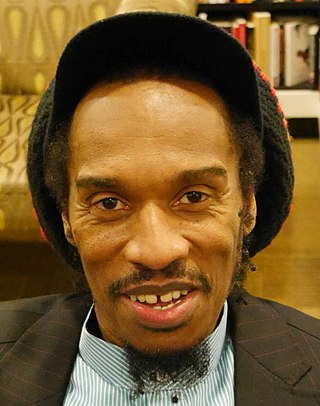
Benjamin Obadiah Iqbal Zephaniah was a British writer, dub poet, actor, musician and professor of poetry and creative writing. He was included in The Times list of Britain's top 50 post-war writers in 2008. Described as "the people's laureate" by the Birmingham Mail, Zephaniah drew on his lived experiences of incarceration, racism and his Jamaican heritage to encourage a wide range of audiences to engage with his creative works.
Selamawi Asgedom or Mawi Asgedom for short, is an author, public speaker, and a refugee of Ethiopian and Eritrean origin.
The Tally Man is the name of two fictional supervillains in the DC Universe.
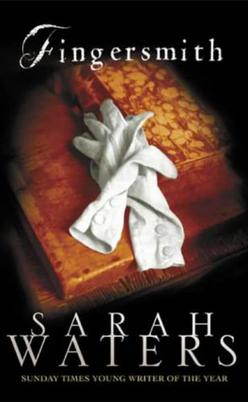
Fingersmith is a 2002 historical crime novel set in Victorian-era Britain by Sarah Waters.

The Woman in White is Wilkie Collins's fifth published novel, written in 1860 and set from 1849 to 1850. It started its publication on 26 November 1859 and its publication was completed on 25 August 1860. It is a mystery novel and falls under the genre of "sensation novels".

David Copperfield is a two-part BBC television drama adaptation of Charles Dickens's 1850 novel of the same name, written by Adrian Hodges. The first part was shown on Christmas Day 1999 and the second part the following day.
The naming convention used in Eritrea and Ethiopia does not have family names and typically consists of an individual personal name and a separate patronymic. This is similar to Arabic, Icelandic, and Somali naming conventions. Traditionally for Ethiopians and Eritreans the lineage is traced paternally; legislation has been passed in Eritrea that allows for this to be done on the maternal side as well.
Sulaiman S.M.Y. Addonia (born 1974, Omhajer, Eritrea) is an Eritrea-born British author who also works at a creative writing academy for refugees. He lived in refugee camps from the age of two years old until he received asylum in England in 1990.

The Other Side of Truth is a young adult novel about Nigerian political refugees, written by Beverley Naidoo and published by Puffin in 2000. It is set in the autumn of 1995 during the reign in Nigeria of the despot General Abacha, who is waging a campaign of suppression against journalists. A Nigerian girl and her younger brother must leave suddenly after their mother is killed in a failed assassination of their outspoken father. They are sent to London but are abandoned and must cope with the police, social services and school bullies. Naidoo won the 2000 Carnegie Medal, recognising the best children's or young adults' book in English published in the United Kingdom during the preceding school year.
"The Freshest Boy" is a short story by American writer F. Scott Fitzgerald. It was first published in the July 28, 1928 issue of The Saturday Evening Post, and was reprinted in Fitzgerald's 1935 collection, Taps at Reveille.
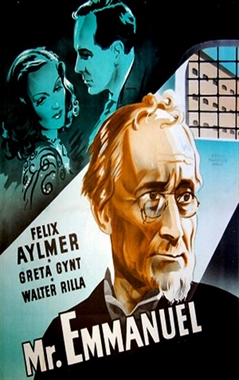
Mr Emmanuel is a 1944 British drama film directed by Harold French and starring Felix Aylmer, Greta Gynt and Walter Rilla.

Negash Ali is an Eritrean artist signed to Warner Chappell Music. Negash have released 3 albums and have worked with names such as Chris Brown, Bob Sinclar, Manu Dibango and many more.
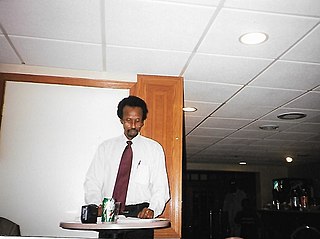
Dr. Mohamed Sirad Dolal was an academic and a member of the central committee and executive council of the Ogaden National Liberation Front (ONLF), a liberation movement in Ogaden determined to free its homeland from Ethiopia.
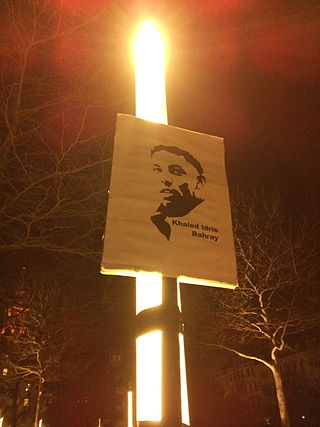
Khaled Idris Bahray was an Eritrean refugee and asylum seeker in Germany, who was stabbed to death on January 12, 2015, in Dresden. Although it was widely speculated and claimed in the media and on social media that the murder had racist motives, some days later an Eritrean roommate of Bahray confessed to the murder.
DejazmatchZewde Gebre-Sellassie was a prominent nobleman, historian, and former deputy Prime Minister of Ethiopia. He was born in the village of Galdu, in the subdistrict of Mecca, to the north-west of Addis Ababa where his father was relegated.

Boy 87 is a contemporary novel by Ele Fountain. The refugee crisis is one of the themes in this novel. It is published by Pushkin Children's Books in the UK and by Little Brown in the US. The book was written while the author was living in Ethiopia.

Tachlowini Melake Gabriyesos is an Eritrean-born long-distance runner. He lives and trains in Tel Aviv, where he runs with the Emek Hefer club and is supported by an International Olympic Committee (IOC) Refugee Athlete Scholarship. He has competed over 3000 metres, 5000 metres, 10,000 metres, the half marathon and the marathon. He finished in 16th place at the 2020 Olympics.
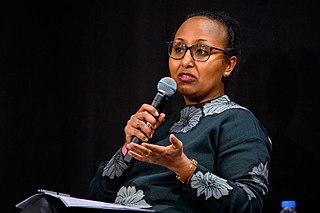
Awet Tesfaiesus is a German politician from Alliance 90/The Greens who has served as a member of the Bundestag from the state of Hesse since 2021. Previously a lawyer who represented asylum seekers and refugees, Tesfaiesus was elected as a city councillor for the city of Kassel in 2016. Tesfaiesus was elected in the 2021 German federal election as a member of the Green Party list in the state of Hesse. She is the first black woman to ever be elected to the Bundestag.
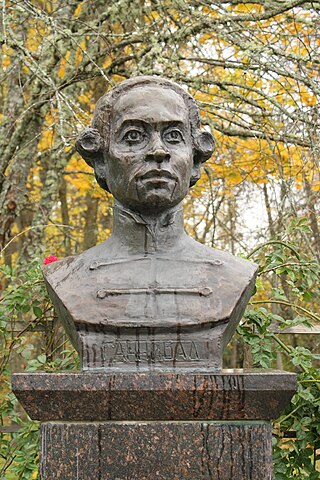
Abram Petrovich Gannibal, also Hannibal or Ganibal, or Abram Hannibal or Abram Petrov, was a Russian military engineer, general-in-chief, and nobleman of African origin. Kidnapped and enslaved as a child by Ottomans, Gannibal was traded to Russia and presented as a gift to Peter the Great, where he was freed, adopted and raised in the Emperor's court household as his godson.














